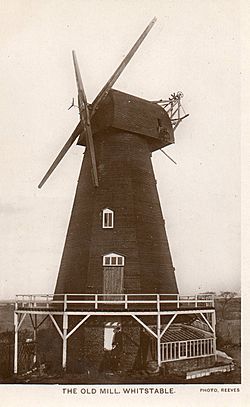Black Mill, Whitstable facts for kids
Quick facts for kids Black Mill, Whitstable |
|
|---|---|
 |
|
| Origin | |
| Grid reference | TR 105 652 |
| Coordinates | 51°20′46.5″N 1°1′20″E / 51.346250°N 1.02222°E |
| Year built | 1815 |
| Information | |
| Purpose | Corn mill |
| Type | Smock mill |
| Storeys | Four-storey smock |
| Base storeys | Single-storey base |
| Smock sides | Eight-sided |
| No. of sails | Four |
| Type of sails | Patent sails |
| Windshaft | Cast iron |
| Winding | Fantail |
| Fantail blades | Six blades |
| No. of pairs of millstones | Three pairs |
Black Mill, also known as Borstal Hill Mill, is a special type of smock mill located in Whitstable, Kent, England. It was built in 1815 and is now part of a private home. You can find it at the end of Millers Court.
Contents
A Look Back: The Mill's Story
How Black Mill Got Its Name
Black Mill was built in 1815. Before it, another mill stood in the same spot, shown on a map from 1736. When it was first built, the mill was painted white. But in 1885, it was covered in tar, which made it black. That's how it got its name, Black Mill!
Because the mill was so tall and easy to see, it was an important landmark for sailors. It helped them know where they were when sailing near the coast. So, when the mill changed color, the Trinity House (the group in charge of lighthouses and navigation) had to be told.
What Happened to the Mill?
The mill stopped working around 1905. Later, in 1928, a famous artist named Laurence Irving (whose grandfather was Sir Henry Irving) turned the mill into his art studio. After that, the mill was changed again and became a motel.
Even though it's not grinding corn anymore, the old tower still has many of its original parts inside. From the outside, you can still see the main supports for the sails and a fake fantail, which is a small windmill that used to turn the main mill to face the wind.
How the Mill Was Built
Inside the Smock Mill
Black Mill is a four-storey smock mill. This means its main body is shaped like a smock (a loose shirt) and has four levels. It sits on a strong, single-storey brick base. There used to be a platform, called a stage, at the first-floor level.
The mill had four large patent sails. These sails were attached to a strong cast-iron windshaft, which is like a big axle. The brake wheel, a large wheel that helped control the speed, is still there. This wheel turned a cast-iron wallower, which was connected to a wooden upright shaft. The great spur wheel, another important gear, also remains.
Grinding the Grain
The mill used its power to turn three pairs of millstones. These stones would grind grain into flour. The mill was designed to turn itself into the wind using a special device called a fantail. This small windmill at the back would automatically spin the main mill so its sails always caught the most wind.
Millers Who Worked Here
Over the years, many different millers operated Black Mill:
- Lawes & Carr (1839 - 1845)
- William Carr (1845)
- Jonathan Rye
- Henry Somerford (1860 - 1866)
- James Callingham (1866 - )
- Callingham Bros. ( - 1899)
- George & William Dawking (1899 - 1905)
Gallery
 | Valerie Thomas |
 | Frederick McKinley Jones |
 | George Edward Alcorn Jr. |
 | Thomas Mensah |



